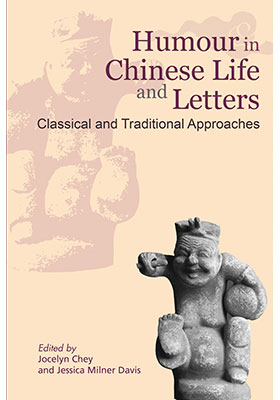Humour in Chinese Life and Letters
Classical and Traditional Approaches
(中國生活與文學中的幽默:古典傳統篇)
ISBN : 978-988-8083-51-0
October 2011
312 pages, 6″ x 9″, 13 b&w illus.
Ebooks
Also Available on
How do Chinese societies approach humour in personal life and in the public sphere? This book addresses the etymological difficulties of “humour” as a concept in Chinese language and explores connections and contrasts with Western styles of humour. Periods discussed range from earliest times to the beginning of the twentieth century, covering many different forms of humour—verbal, visual and behavioural. The book brings together internationally respected scholars in Chinese studies with other specialists to explore humour through modes of enquiry in cultural and political history, linguistics, literature, drama and the history and philosophy of science.
The unifying focus of the book is humour and laughter in their many forms in Chinese tradition and culture. Chapters are written in a common style. Readers more generally interested in humour and laughter—not well-understood forms of human behaviour—will also find the book casts light on significant differences in their concepts and practice between cultures.
“An excellent insight into classical and traditional approaches. Chinese humour is unique and important, and there has long been a need for an erudite and comprehensive account of its nature, philosophy and history.” —Christie Davies, Emeritus Professor of Sociology, University of Reading, UK
“It gives me great pleasure to endorse this wonderful publication co-edited by esteemed academics. This book will be very helpful to anyone wanting to understand or do business with China.” —Patrick WU Po Kong, Standing Committee Member of The Chinese General Chamber of Commerce, Hong Kong
“Humour in Chinese Life and Letters is a highly engaging, thought-provoking, and most enjoyable book. Breaking new ground in the comparative study of humour and laughter, this book has shown me that many things are found—rather than lost—in translation.” —Giselinde Kuipers, Norbert Elias Professor of Sociology, Erasmus University and University of Amsterdam
“A timely contribution to the sparse literature on the history and expression of humour in Chinese society. Carefully annotated with original Chinese sources, this is a valuable reference and an enjoyable introduction to a poorly understood but integral aspect of everyday Chinese life.” —Kee Pookong, Professor and Director, Asia Institute, University of Melbourne
“Humor is serious business anywhere. It can also be dangerous. Humour in Chinese Life and Letters, Jocelyn Chey and Jessica Milner Davis’s two-volume collection of essays on aspects of humor in Chinese literature, daily life and art over the last three millennium, is a remarkable testament to the enduring importance of humor throughout the Chinese dynasties up to the present, to elements of its continuity, and of its changes over this time.” —Asian Review of Books
“If you are seeking edification on the topic of humor in China rather than an anthology of humor, then this book is a wonderful place to start. It contains contributions by ten scholars . . . who write about a broad but highly selective spectrum of humor in China, from the Confucian Analects of the pre-Qin era to Lin Yutang’s Analects Fortnightly journal in the 1930s. . . . What the reader will find in this volume is an impeccably researched and valuable addition to the sparse field of studies in English on humor in China.” —Journal of the American Oriental Society
“This enjoyable volume explores similarities and contrasts with Western aspects of humour in a comparative perspective, and presents several facets of analogous phenomena in traditional and modern China, from the earliest times to the first decades of the twentieth century. It covers many different forms of humour—verbal, visual and behavioural—in literature and the arts, drama, history and philosophy, in private life and in the public sphere.” —Ming Qing Studies
“[Humour in Chinese Life and Culture] is indeed ambitious; together with its companion volume, Humour in Chinese Life and Letters, compiled by the same editors, this project covers the whole of Chinese history and the vast cultural sphere of Greater China.” —Haomin Gong in The China Quarterly
“This book lays an excellent foundation for cross-cultural understanding of humor in Chinese culture and literature and will be essential reading for anyone who would venture into the serious study of Chinese humor.” —Moira Marsh, Humor




